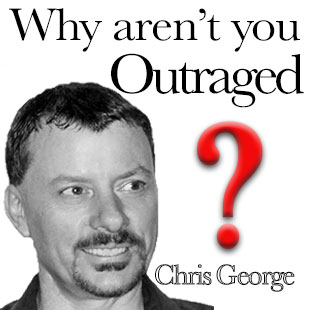
(CHRIS GEORGE / iNFOnews.ca)
November 06, 2018 - 12:02 PM
OPINION
Government and business are joined at the hip. Together they are supposed to be the engine that powers our society. Both deal with budgets. Both have people counting on them to provide value. But something they do very differently is how they count the money that flows through their organizations.
The government gets a free ride a lot of times because they have special accounting rules and often don't have to worry about accountability as much as business. Businesses have to follow the rules and one of the strictest are the generally accepted accounting principles (GAAP) that chartered accountants are so fond of. At least that is what I always thought. Apparently, I thought wrong.
This came up in a big way this week when the content of a talk given by a vice president from the Alberta Energy Regulator (AER) this February came out in the media.
An estimate of $260 billion in liability for corporate pollution of the environment formed the backbone of the content. And it was that same number that prompted the regulator to issue an apology the following day. And in totally unrelated news the head of that regulatory body, Jim Ellis, will be resigning in January after six years at the helm. The political backlash in both Edmonton and Ottawa has been intense.
The previous number that the AER had published was $58 billion dollars, significantly less than the $260 billion discussed during the February presentation. What is astonishing to me is that neither number is likely anywhere even close to being real and that we have major corporations operating in this country that either can't or won't tell anyone, including their shareholders, what their true assets and liabilities are. GAAP is supposed to rule the books on the corporate side and that includes when making estimates of future liability that may put shareholder capital at risk.
Now many will fully expect the government to get the numbers wrong. After all, they don't really have to worry about shareholders or GAAP. And they really have no business running a business beyond setting prudent standards to ensure that taxpayers do not end up footing the bill for business expenses. And that is what is really going on here. Resource industries in this country have always been adept at dodging their responsibilities when they can. The billion dollars the federal government will likely be spending to remediate the Giant Mine in the Yukon is a testament to that.
It may seem that GAAP is a rather esoteric thing, hypothetical almost. But it is something that every small business person and every bookkeeper and accountant in the land are intimately familiar with. Interestingly, it is the federal government that sets that standard via the Canada Revenue Agency. They have a very clear understanding of GAAP and are always available to explain things to you if your interpretation doesn't quite jibe with theirs. It is really the foundation of our tax system and should provide a level playing field for those competing in the marketplace.
All that goes out the window if you have the connections though. Never mind taxes, it seems that if you have solid connections you can also dodge all sorts of other consequences. Shady accounting practices are just the tip of the iceberg.
It seems that our resource corporations are telling us that being accountable for their actions is either too hard or simply not profitable. My feeling is that these corporations have a very good idea of exactly what their liability is and that it is far too large for them to ever deal with profitably. Lobbying politicians and working hard to reduce or eliminate regulations designed to protect taxpayers seems to be a big part of their business. The consequences of this are easy to see if you look.
Set aside the environment for a minute and think about that. Can you come up with any other sector in our economy that is allowed to duck and dodge financial responsibility for their actions?
The owners of these corporations are already protected from their own financial responsibilities by a four-hundred-year-old set of laws. Sitting idly by while they work on our government to convert corporate liability into shareholder profit doesn't really sit well with me.
I think it is time to hold these entities to account and for the government that is supposed to represent all of us to get off its ass and start doing so.
— Chris George believes one measure of a just society is found in how well it balances fiscally conservative economics with social responsibility and environmental soundness in all of its living arrangements.
We welcome your comments and opinions on our stories but play nice. We won't censor or delete comments unless they contain off-topic statements or links, unnecessary vulgarity, false facts, spam or obviously fake profiles. If you have any concerns about what you see in comments, email the editor.
News from © iNFOnews, 2018